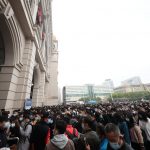‘Do Western media expect us to cry all day long?’ Wuhan residents rebut BBC video for prejudice
“西方媒体希望我们整天哭吗?”武汉居民反驳BBC视频的偏见

The BBC has released news items recording the situation in Wuhan one year after the coronavirus lockdown, but these reports have not been welcomed by Wuhan residents, as many believed the carefully chosen settings, lighting and biased voiceovers showed some Western reporters'”sour grapes” mentality.
The latest piece released on Tuesday which was produced by John Sudworth is a typical example, which called Wuhan “ground zero” and “where the pandemic began.”
When Sudworth’s interviewees told him the virus was from other places and China was a victim, the reporter described it as “a remarkable new narrative” and expressed sarcasm, disregarding multiple studies from international scientists suggesting the virus could have long existed before being discovered in Wuhan.
The voiceover was as emotional as a poetry recital. The settings were chaotic and the lighting was dark, which were “typical camera techniques to give the audience an impression of suppression and disorder,” film and TV industry insiders noted.
Such tricks were pointed out by Chinese netizens, who mocked the reporter’s prejudice. “Interviewees who cannot say what they want must have been brainwashed, and Sudworth will use his emotional voiceover to tell the truth,” a netizen posted after the video started circulating on social media.
“We all lived through the lockdown. Why is it that what Fang Fang said must be the truth, and others’ words must be the results of propaganda?” Wuhan resident Ye Meng asked after watching the video.
“No matter what the interviewees said, those Western media outlets will always find an angle to attack China. Bias is so deeply embedded in some foreigners’ minds that they cannot admit China’s success in any field,” Ye told the Global Times on Wednesday.
Sudworth also used footage of police arresting a person to hype that the lockdown was a violation of human rights. The footage turned out to be a highway epidemic control drill in Nanyang, Henan Province on February 21 last year, where a man tried to drive directly through a checkpoint and attacked police when stopped.
This is not the first time that BBC reports were scorned by the Chinese public. Another video report on Wuhan not only used an incorrect Chinese map, but also mistakenly put Wuhan and Hubei in the actual positions of North China’s Shaanxi and Ningxia Hui Autonomous Region.
Chinese netizens therefore urged the BBC to recruit some people with knowledge of geography. “How can your reporting be reliable when the reporter does not even know where he is?” read one comment.
The New York Times, in a Saturday article, warned China against “forgetting the pain after a scar heals,” criticizing Wuhan and China for not reflecting on the crisis.
Pouring cold water on China’s achievements in epidemic control only further exposed the “sour grapes” mentality of some Westerners, observers said.
Wuhan and China endured the hardship. People learned from the experience, and they deserve to move on with their lives. Smearing China and Chinese people’s efforts will not help any country emerge from the pandemic, they said.
“What do the New York Times and BBC expect from us? Crying all day long? No, we are busy creating a better life,” a Wuhan-born woman surnamed Zhan who works in Beijing told the Global Times.








